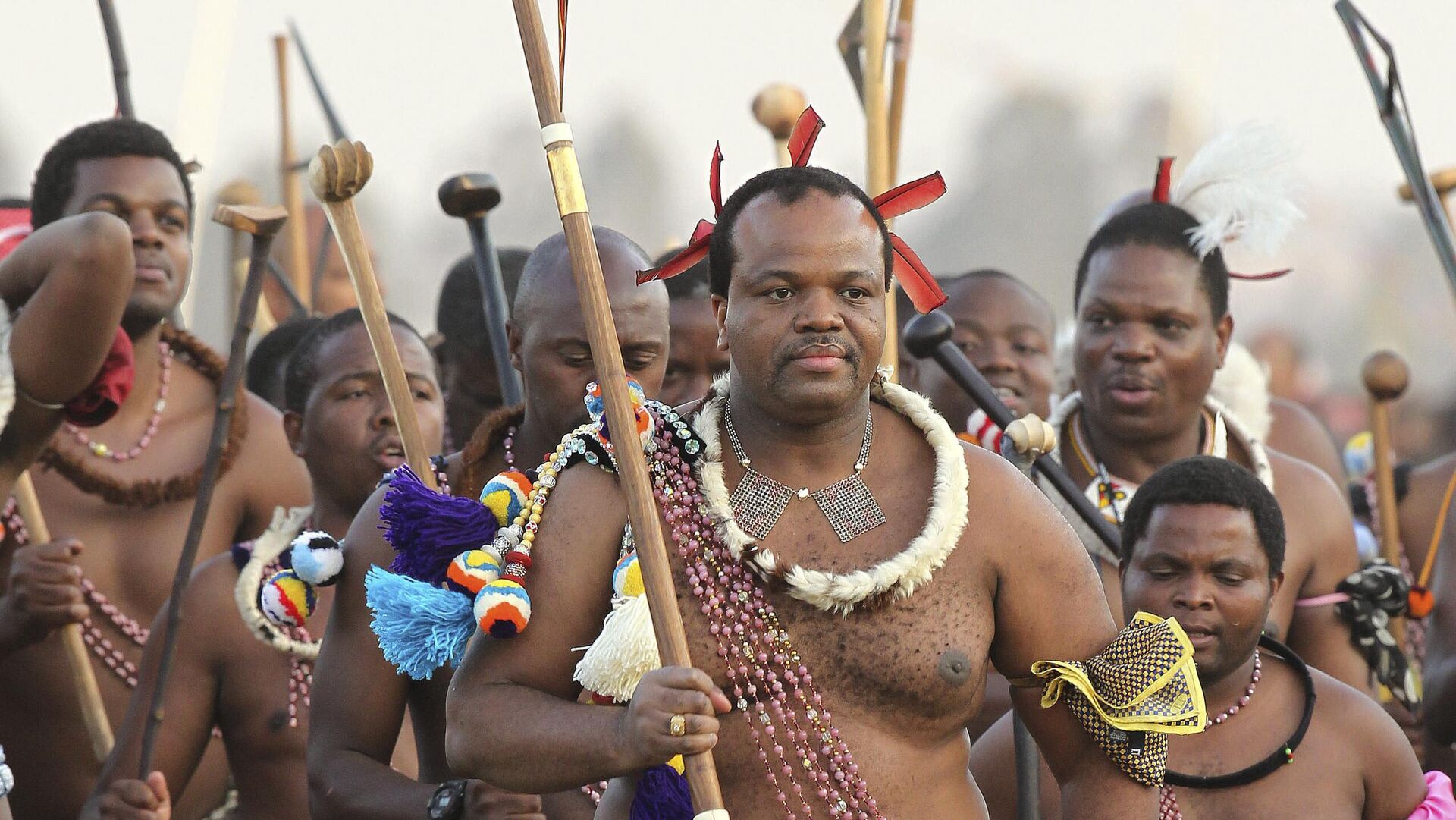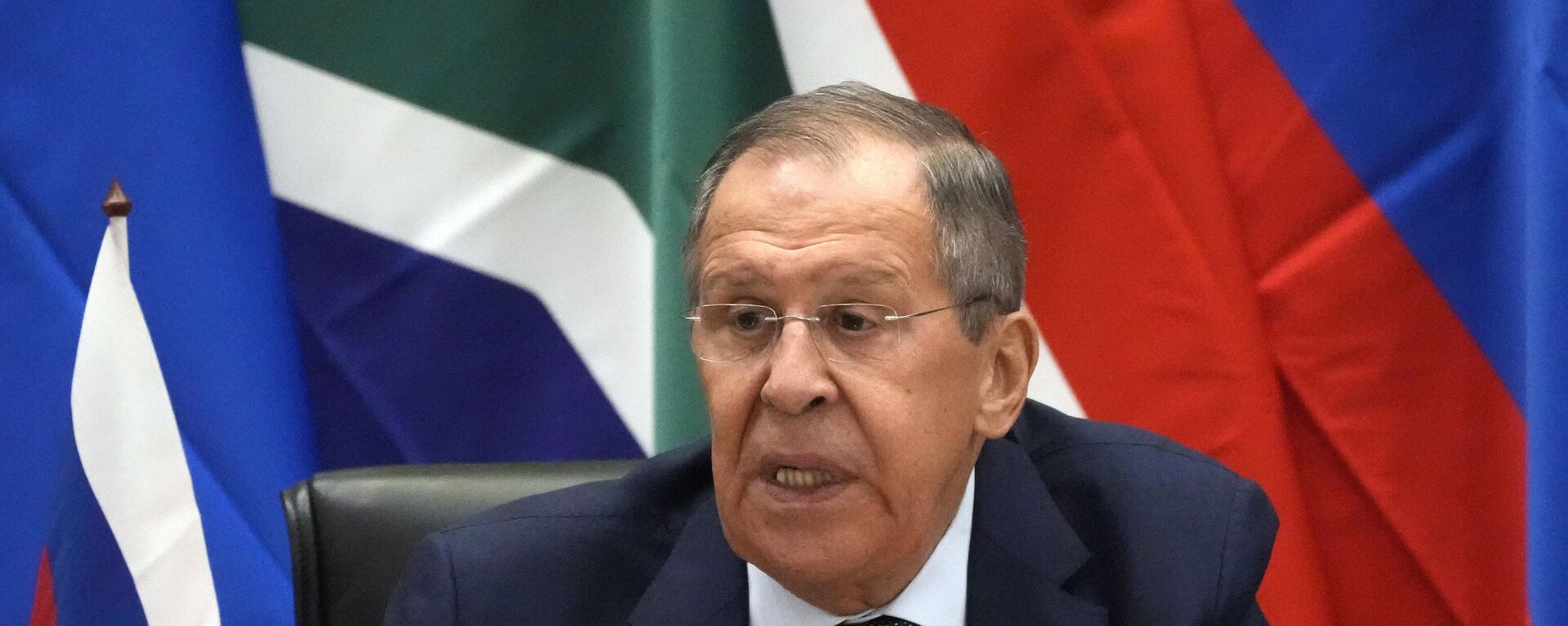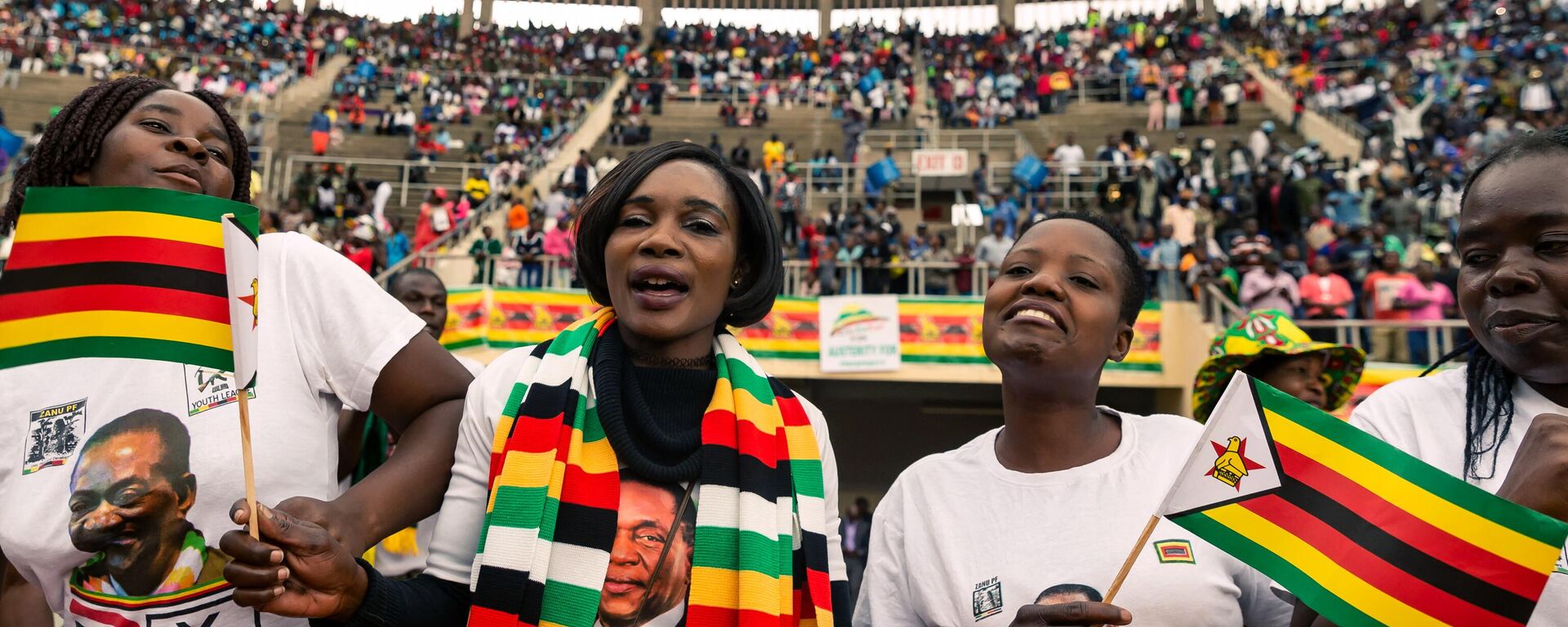https://en.sputniknews.africa/20230419/breaking-with-colonial-past-eswatini-marks-fifth-anniversary-since-name-change-1058700258.html
Breaking With Colonial Past: Eswatini Marks Fifth Anniversary Since Name Change
Breaking With Colonial Past: Eswatini Marks Fifth Anniversary Since Name Change
Sputnik Africa
The Kingdom of Eswatini is marking on Wednesday the fifth anniversary of breaking with the Southern African nation's colonial past by changing its name from Swaziland on April 19, 2018.
2023-04-19T17:57+0200
2023-04-19T17:57+0200
2023-04-19T17:57+0200
sub-saharan africa
southern africa
eswatini (swaziland)
anniversary
king mswati iii
colonialism
british colonialism
https://cdn1.img.sputniknews.africa/img/07e7/04/13/1058703967_0:0:2552:1437_1920x0_80_0_0_b6120db86abc28cd4e44476111bd15c8.jpg
The Kingdom of Eswatini is marking its fifth anniversary since changing its name from Swaziland on April 19, 2018.On this day in 2018, while marking the country's 50th anniversary of independence from Britain and his 50th birthday, King Mswati III announced the renaming to the Kingdom of Eswatini, which means "land of the Swazis" in the local Swazi language. The monarch said at the time that the name was a symbolic move towards reclaiming the country's pre-colonial identity.Swaziland was a British protectorate from 1906 until 1968 when it gained independence and became a monarchy under King Sobhuza II. During the colonial period, the British imposed their authority, customs, and language on the Swazi people, and established a system of land ownership and political representation that favored white settlers. However, the Swazi people maintained their cultural identity and resisted British control through political mobilization and protests. After independence, Eswatini remained a monarchy under King Sobhuza II and his successors, but has faced challenges of poverty, unemployment, and spread of HIV/AIDS.As Eswatini marks the fifth anniversary of the name change, many reflect on the significance of Mswati III's decision. While a name change alone may not solve the country's problems or address the deeper legacy of colonialism and its ongoing effects, it is viewed as an important symbolic gesture towards reclaiming pre-colonial identity and promoting a sense of national unity.Getting Rid of Colonial Heritage in AfricaSince gaining independence, an increasing number of African countries have been making bold moves towards reclaiming their pre-colonial identities and renaming themselves. This symbolic gesture is part of a broader trend in Africa towards decolonization.The region known as the Golden Coast in West Africa was renamed Ghana in 1957, after becoming the first African country to gain independence from colonial rule.In a manner similar to Eswatini, another Southern African country, Botswana changed ints name from Bechuanaland when gaining independence in 1966. Two years earlier, the British protectorate of Nyasaland became the independent state Malawi, named after the lake known locally as Malawi (the name Nyasa, which the British preferred, is spread in modern Tanzania, which was also under British colonial rule).Other notable examples are Zimbabwe and Zambia, which were formerly known as Southern Rhodesia and Northern Rhodesia, respectively. The countries were named after Cecil Rhodes – a British mining magnate and Prime Minister of the Cape Colony – in the late 1800s during the British South Africa Company's administration of the two territories.Zambia was renamed in 1964 on its independence from British rule, while the name change of Zimbabwe took place in 1980 following years of struggle against white-minority rule. In both the two neighboring nations, the name change was seen as a significant step towards emancipation and self-determination.Previously known as Upper Volta, Burkina Faso also changed its name in 1984 after a popular uprising that saw the overthrow of longtime leader, Jean-Baptiste Ouedraogo, and the beginning of the presidency of the iconic Thomas Sankara. The country's new name, Burkina Faso, was chosen because it meant "Land of the Upright/Honest People" in Moore and Dioula, two of the country's major languages.At the time, the renaming of Burkina Faso was seen as a symbolic gesture towards reclaiming the pre-colonial history and identity of the country. Upper Volta was a name that had been imposed by the French during their colonial rule and held little meaning to the Burkinabe people. By choosing their own name, the people of Burkina Faso were taking a small but significant step towards asserting their independence and sovereignty.
https://en.sputniknews.africa/20230124/1058704155.html
https://en.sputniknews.africa/20230418/brutal-coercive-expert-recalls-colonialism-as-zimbabwe-celebrates-independence-day-1058687508.html
southern africa
eswatini (swaziland)
Sputnik Africa
feedback@sputniknews.com
+74956456601
MIA „Rossiya Segodnya“
2023
Muhammad Nooh Osman
https://cdn1.img.sputniknews.africa/img/07e7/04/0a/1058467512_0:0:1280:1280_100x100_80_0_0_ec723833bcbfcaed2e21952965ad99e4.jpg
Muhammad Nooh Osman
https://cdn1.img.sputniknews.africa/img/07e7/04/0a/1058467512_0:0:1280:1280_100x100_80_0_0_ec723833bcbfcaed2e21952965ad99e4.jpg
News
en_EN
Sputnik Africa
feedback@sputniknews.com
+74956456601
MIA „Rossiya Segodnya“
Sputnik Africa
feedback@sputniknews.com
+74956456601
MIA „Rossiya Segodnya“
Muhammad Nooh Osman
https://cdn1.img.sputniknews.africa/img/07e7/04/0a/1058467512_0:0:1280:1280_100x100_80_0_0_ec723833bcbfcaed2e21952965ad99e4.jpg
eswatini, swaziland, african kingdom, african king, empire of great zimbabwe, anniversary, eswatini marks 5th anniversary, breaking with colonial past, colonial history, colonialism, britain, british colonialism, king mswati iii, eswatini rename, zimbabwe, ghana, zambia, zambia rename, country name change, name change, african countries name change,
eswatini, swaziland, african kingdom, african king, empire of great zimbabwe, anniversary, eswatini marks 5th anniversary, breaking with colonial past, colonial history, colonialism, britain, british colonialism, king mswati iii, eswatini rename, zimbabwe, ghana, zambia, zambia rename, country name change, name change, african countries name change,
Breaking With Colonial Past: Eswatini Marks Fifth Anniversary Since Name Change
Muhammad Nooh Osman
Writer/Editor
King Mswati III declared that Swaziland had been renamed the Kingdom of Eswatini on April 19, 2018, marking the state's 50th anniversary of independence. The African King emphasized that the choice of name was intended to honor the country's rich culture and heritage while moving away from its colonial past.
The Kingdom of Eswatini is marking its fifth anniversary since changing its name from Swaziland on April 19, 2018.
On this day in 2018, while marking the country's 50th anniversary of independence from Britain and his 50th birthday, King Mswati III announced the renaming to the Kingdom of Eswatini, which means "land of the Swazis" in the local Swazi language. The monarch said at the time that the name was a symbolic move towards reclaiming the country's
pre-colonial identity.
"Swaziland will return to its original name," Mswati III said in front of a crowded stadium in 2018. "At independence, all African countries have taken over their former name, the one before the colonization. Swaziland is the only country to have kept its name from the colonial era, so from now on, the country will officially be called the Eswatini Kingdom."
Swaziland was a British protectorate from 1906 until 1968 when it gained independence and became a monarchy under King Sobhuza II. During the colonial period, the British imposed their authority, customs, and language on the Swazi people, and established a system of land ownership and political representation that favored white settlers.
However, the Swazi people maintained their cultural identity and resisted British control through political mobilization and protests. After independence, Eswatini remained a monarchy under King Sobhuza II and his successors, but has faced challenges of poverty, unemployment, and spread of HIV/AIDS.
As Eswatini marks the fifth anniversary of the name change, many reflect on the significance of Mswati III's decision. While a name change alone may not solve the country's problems or address the deeper
legacy of colonialism and its ongoing effects, it is viewed as an important symbolic gesture towards reclaiming pre-colonial identity and promoting a sense of national unity.
Getting Rid of Colonial Heritage in Africa
Since gaining independence, an increasing number of African countries have been making bold moves towards reclaiming their pre-colonial identities and renaming themselves. This symbolic gesture is part of a broader trend in Africa towards decolonization.
The region known as the Golden Coast in West Africa was renamed Ghana in 1957, after becoming the first African country to gain independence from colonial rule.
In a manner similar to Eswatini, another Southern African country, Botswana changed ints name from Bechuanaland when gaining independence in 1966. Two years earlier, the British protectorate of Nyasaland became the independent state Malawi, named after the lake known locally as Malawi (the name Nyasa, which the British preferred, is spread in modern Tanzania, which was also under British colonial rule).
Other notable examples are Zimbabwe and Zambia, which were formerly known as Southern Rhodesia and Northern Rhodesia, respectively. The countries were named after Cecil Rhodes – a British mining magnate and Prime Minister of the Cape Colony – in the late 1800s during the British South Africa Company's administration of the two territories.
Zambia was renamed in 1964 on its
independence from British rule, while the name change of Zimbabwe took place in 1980 following years of struggle against white-minority rule. In both the two neighboring nations, the name change was seen as a significant step towards emancipation and self-determination.
Previously known as Upper Volta, Burkina Faso also changed its name in 1984 after a popular uprising that saw the overthrow of longtime leader, Jean-Baptiste Ouedraogo, and the beginning of the presidency of the iconic Thomas Sankara. The country's new name, Burkina Faso, was chosen because it meant "Land of the Upright/Honest People" in Moore and Dioula, two of the country's major languages.
At the time, the renaming of Burkina Faso was seen as a symbolic gesture towards reclaiming the pre-colonial history and identity of the country. Upper Volta was a name that had been imposed by the French during their colonial rule and held little meaning to the Burkinabe people. By choosing their own name, the people of Burkina Faso were taking a small but significant step towards asserting their independence and sovereignty.




